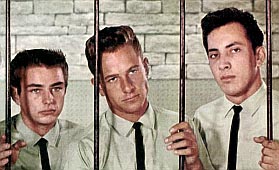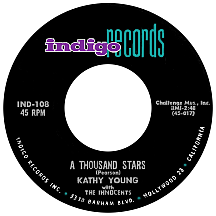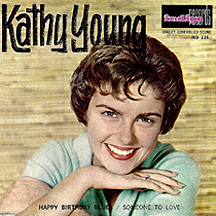KATHY YOUNG WITH
THE INNOCENTS
A Thousand Stars
Darron Stankey set his sights on making it as a vocal group singer while growing up in Sun Valley, California. In 1958, after giving it a shot with a couple of amateur groups, the 16-year-old got together with local guys Jim West and Al Candelaria, each about a year older, as The Echoes (a name that had already found its way onto wax with more than one group on the Rockin', Gee, Combo and Specialty labels). Their harmonies were solid enough to get them in the door at Herb Alpert's Andex Records. In the fall of 1959 the label released their recording of a ballad written by Jim, "Time," but after several weeks of radio indifference began promoting the flip side, the uptempo "Dee-Dee-Di-Oh," penned by Darren and Al, which also failed to ignite. Andex dropped them.
In 1960, the group auditioned for Kim Fowley and Gary Paxton (Flip of Skip and Flip) with a ballad the three had written together, "Honest I Do." Impressed by the trio's well-executed harmony singing, they recorded them later the same day. Aware of some of the previous Echoes groups, Fowley suggested they call themselves The Innocents; the guys didn't exactly flip over the name but felt they weren't in much of a position to reject it. Good move. "Honest I Do," on the Indigo label, took off in July and reached the top ten on Los Angeles stations the following month, just as it started to appear on national charts, where it hit the top 30 in September.
The Wink Martindale P.O.P. Dance Party was broadcast every afternoon on L.A.'s channel 13, KCOP-TV, from Santa Monica's Pacific Ocean Park. After an appearance on the show, as the Innocents were signing autographs, a young girl approached them, mother in tow, claiming she was a good singer. The group paid little attention to the girl, but their manager, Jim Lee, suggested she come by the studio sometime. Kathy Young was just 14, a native of Santa Ana, living at the time in Long Beach. She had competed in (and won) a couple of talent contests at Hamilton Junior High in spite of a nagging stage fright that she conveniently neglected to mention to Lee that day at P.O.P. Months went by before she finally showed up at the recording studio where Fowley, Paxton and company were busy plotting their respective music business legacies.
Kathy had written some songs but Kim and Flip passed them over in favor of "A Thousand Stars," a doo wop ballad introduced in 1954 by Queens, New York R&B group The Rivileers (written by the group's lead singer Gene Pearson) on the Baton label. Young's distinctly teenage take on the track, including her own acoustic guitar playing, seemed a bit sparse, so Lee arranged to have the Innocents brought in to do backing vocals at the session while Joel Scott Hill (of The Strangers, another act he managed) played electric guitar. The single was released on Indigo in September '60, credited to Kathy Young with the Innocents. L.A. radio jumped on it like gangbusters; top 40 stations KRLA and KFWB both ranked the song number one in time for her 15th birthday October 21st. It held that position through mid-November, just as it was hitting the national top ten, where it remained until January '61.

The Innocents continued to make records separately from Young. "Gee Whiz," a ballad written by Leon Rene (using the alias Jimmie Thomas) and Jeanne Vikki and first recorded by Bob and Earl for Rene's Class label two years earlier, was tailor-made to their harmonic abilities and returned them to the top 30 in January. Indigo released an album by the trio, Innocently Yours, its cover depicting them behind the bars of a makeshift jail; Kathy had her own album release, The Sound of Kathy Young. The next Young/Innocents 45 was Lee's "Happy Birthday Blues" and that, too, was a top 30 hit in March '61. It had been a highfalutin' eight months of hits with "A Thousand Stars" providing the peak midway. Then the struggle began: the next single by Young and the guys, "Our Parents Talked it Over," received some L.A. play but fell flat elsewhere. "Magic is the Night," adhering to the ballad formula of the others, fared a bit better but managed only a few weeks on the lower end of the charts that fall.
There were three more releases by the Innocents on Indigo before Stankey, West and Candelaria moved on. Kathy forged ahead with some solo releases including a remake of Rosie's "Lonely Blue Nights" before leaving Indigo for Monogram Records, a company Jim Lee started in 1962. Just one single, "Dreamboy," came out before attention began centering on Chris Montez, whose "Let's Dance" had suddenly become a smash for the new label. Kathy stuck around but found herself in limbo for the next couple of years. The Innocents, meanwhile, had two singles released on Reprise in 1962, one on Decca in '63 and another on Warner Bros. in '64 before their ship sailed. In 1964, Monogram revived Montez's two-year-old recording of "All You Had To Do (Was Tell Me)," adding Young's backing vocals to the original track, rereleasing it with credit to Chris and Kathy. The record scraped the national charts, nearly unnoticed, but received considerable airplay on the duo's home turf, landing them in the Los Angeles top ten in March, a half-step ahead of the arriving British Invasion.
On a trip to England in 1964, Kathy met John Maus (better known as John Walker) of The Walker Brothers, an American band on the verge of greater success in the U.K. and other parts of the world than in its homeland (though they did enjoy two big U.S. hits in '65-'66). John and Kathy wed but divorced a few years later. She returned to the U.S. in 1969 and for many years resigned herself to a routine life among the masses. As the new century dawned, Kathy Young joined the ranks of performers on the oldies circuit, looking fabulous in her fifties with a voice as crisp and controlled as it had been at 15, defying the notion that four whole decades had passed.



